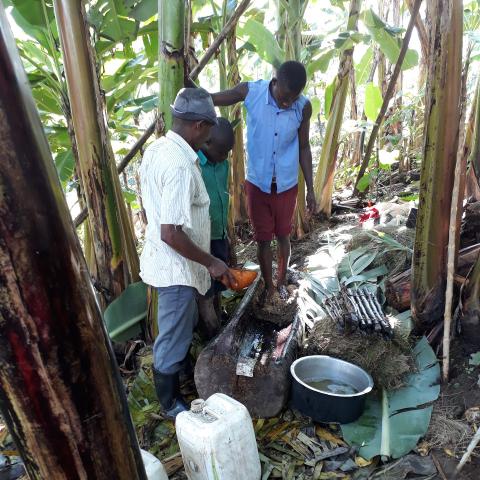Traditional sorghum beer key to conflict settlement in rural Uganda
In rural Uganda, both clan councils and government institutions play an important role in settling local disputes. This leads to tensions around the issue of sovereignty: who ultimately decides on things? These tensions often revolve around the use of locally brewed beer in clan councils. But the two kinds of authorities also need each other to maintain their sovereignty in the district. That’s what Danse de Bondt concludes in her dissertation which she will defend at Tilburg University on Friday 17 March 2023.
You see, courts do not settle disputes. If you bring a civil case to the magistrate court (…) would they in the end become friends?
A local officer pointed this out to Danse de Bondt during her fieldwork in the district of Kisoro, rural Uganda. It illustrates an important difference between the courts and traditional forms of authority: whereas courts give judgements, traditional authorities try to harmonize their community.
This was also one of De Bondt’s findings. She explored how people working for clan councils and government institutions relate to, cooperate and compete with each other for sovereignty. Based on nine months of ethnographic fieldwork (2018-2019) she shows how popular ideas about ‘the state’ and ‘the clan’ gain meaning through everyday encounters between residents, government officials, and clan councilors, and how they greatly influence decision making practices at the local level.
Beer and reconciliation
Locally brewed sorghum beer plays an essential role in clan councils, De Bondt discovered. For breaking a clan rule a jerrycan of beer can for instance be the fine, or a sum of money representing it. The money is used to invest in community development, such as improving roads, purchasing a well, etc.
De Bondt: “What I love about the alcohol practices of the clan councils I have studied in Uganda is the way in which ‘traditional’ alcohol, specifically sorghum beer, symbolizes the care and protection they provide to their members as a clan. The use of this type of beer is a way for the clan to position themself in relation to the state, which is often accused of corruption and being negligent toward rural residents.”

Beer also features in dispute settlement. Depending on the type of dispute, the beer is used to reconcile the quarreling parties and to thank the clan council for their time. It is precisely the role of reconciliation, using this beer, that makes the clan now so different from the Ugandan state legal system, where the judge decides who is ‘right’ and leaves the parties with a lot of costs and often without having resolved the conflict.
Alcohol and power struggles
At the same time, in tensions between clan councils, government councils, the local court and the police, moral discussions around alcohol are used in the struggle for power. Official authorities emphasize the ‘backward’ customs of clan councils and point out the dangers of alcohol, whereas clan councils point to the importance of traditional norms and values (reconciliation) and emphasize that "the state" seems lost. Nevertheless De Bondt argues that the clan councils and state authorities need one another to maintain their ‘shared’ positions of sovereign power in the district.
PhD Defense
Danse de Bondt will defend her dissertation on Friday 17 March 2023, 13.30 hrs at Tilburg University and can be witnessed by livestream. Title dissertation: ‘Alcohol, Clan Councils and Colloquial Understandings of the State in Rural Uganda’. Supervisors: Prof. L.H.J. Adams, Prof. P. Nugent; co-supervisor: Dr. P.M. Paiement.
Note to editors
For more information please contact Danse de Bondt via e-mail d.a.m.debondt@tilburguniversity.edu. A review copy of the dissertation can be requested at persvoorlichters@tilburguniversity.edu.
